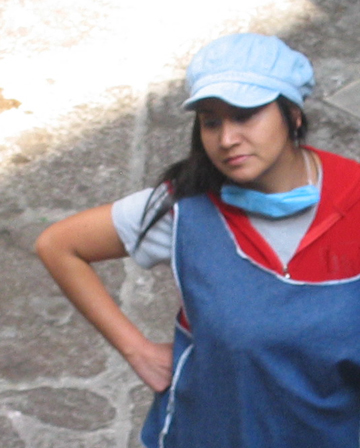WELCOME TO THE ARCHIVE (1994-2014) OF THE MAQUILA SOLIDARITY NETWORK. For current information on our ongoing work on the living wage, women's labour rights, freedom of association, corporate accountability and Bangladesh fire and safety, please visit our new website, launched in October, 2015: www.maquilasolidarity.org
February 24, 2009

Shortly after Christmas 2005 Mexico City-based actress Inti Barrios was informed that her brother, labour rights activist Martin Barrios, had been jailed in their home state of Puebla for his work on behalf of local garment workers.
Inti immediately rushed to Tehuacan, Puebla where she joined hundreds of maquila workers, as well as human rights, indigenous, and independent union organizations, in a campaign to free Martin. During the following weeks Inti spent a lot of time among the maquila workers who now stood behind her brother, listening to their stories.
"When Martin was finally released on January 12, 2006 I looked for a way to give thanks to the workers and labour organizations that had stood in solidarity with him," Inti tells MSN. To do so she resurrected a fashion show she had put on back in 2002, which explored the stories of workers who manufacture blue jeans.
"I decided to restage the show and incorporate the stories I had heard while campaigning for Martin," says Inti. She then spoke to her brother and his colleague Rodrigo Santiago Hernandez, of the Human and Labour Rights Commission of the Tehuacan Valley, about using a book they had produced with MSN on labour rights in the jeans industry in Tehuacan as the factual background for the play.
Inti says she spent months experimenting and exploring which scenes she wanted to use, a difficult task because workers and others in the field would often plead with her to include their experiences of maquila life in the Monologues.
Eventually nine monologues were chosen; each of them unique stories about difficult aspects of maquila life, which together give an overall account of the plight of maquila workers from various perspectives.
In September 2006, the play was workshopped at a meeting of the Espacio, a network of Mexican women's and labour rights groups advocating for maquila workers' rights. The audience was familiar with the topic and didn't hesitate to give their opinions about the facts being interpreted in the play.
"They also enjoyed it as a play and helped me make changes to the arrangement of the scenes," says Inti.
The full play debuted in October of 2006 in La Capilla theatre in Mexico City, where it was well received with record ticket sales.
From the outset Inti's goal has been to take the play to the major maquila zones in the country. But although she was willing to put on the performance for free, and received invitations to bring the play to many of these places, a lack of funds limited the group's travel.
Their break came last year when the group - now called Costureras de Sueños (Dream Weavers) - received financial support from Semillas, a Mexican women's fund that supports local women's and labour rights groups.
With their support, and in coordination with Socorro Chablé of the Centre for the Promotion and Defense of Labour Human Rights (CEPRODEHL) and the group Indignación, Inti was able to take the Monologues on a tour to the Yucatán Peninsula where a large number of maquilas operate.
"During this tour we decided to do something which we had dreamed about before but never had the opportunity to do, which was to put on the play outside of an actual maquila," recounts Inti.
A few monologues were chosen and shortened and on November 25th - the International Day for the Elimination of Violence against Women - the play was taken to an industrial park in Merida, Yucatan.
Soon after the actresses began the performance, several maquila managers emerged, telling Inti and the group to leave and threatening to call the police. Yet after some intense negotiations the managers agreed to let the play go on, if the group promised to leave after 30 minutes.
"So we put on the play for about 40 minutes, which coincided with a shift change and lunch break for some workers," says Inti.
"Workers that came out during their lunch break saw the play and it had an immediate effect, which I thought was very positive," she says. According to Inti there seemed to be instant empathy created between the workers and the actresses.
Some workers looked on very discretely for fear of what management might think but even they eventually let loose and started laughing or shouting in agreement with the scenes they saw. In all about a hundred people saw the play.
After having seen what an immediate and strong impact the play had on workers, Inti now hopes to do this type of "theatre of intervention" in other parts of the country. She says she would like to take the play to the maquilas in Guadalajara and to maquila communities along the border, but concedes that this year the group will have to raise new funds for this to be possible since their initial funding ran out in 2008.
Plans are also afoot for Inti and another Costureras de Sueños member to present two of the monologues in Managua, Nicaragua on March 8, International Women's Day, at the annual Colloquium of the Movement of Working and Unemployed Women, Maria Elena Cuadra (MEC).
In the future, Inti would love to develop a global version of the play that includes workers' stories from Central America, India, and maybe China, given that the themes are so universally applicable.
Though funding will be an issue, Inti is optimistic. She believes that the play now has a life of its own. "This year we are even invited to a festival in Puebla," she says, "the city where my brother was jailed, where we once had to sneak into the Zocalo (central square) to perform."